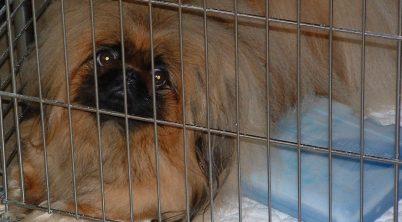The Pekingese, a toy breed with a regal history, hails from ancient China where they were companions to Chinese royalty, treasured for their lion-like appearance and demeanor. This breed’s distinct personality is characterized by a confident and independent streak, embodying both the grace and dignity of their imperial past. With their deep connection to history, these dogs have been esteemed members of Chinese society for centuries, a living symbol of cultural heritage.
Despite their noble roots and bold spirit, Pekingese are prone to specific health challenges that prospective and current owners should be aware of. Their unique physical characteristics, such as a flat face, known as brachycephaly, and their compact body structure, contribute to their susceptibility to certain health issues. Addressing these health concerns is vital for maintaining the well-being and longevity of these cherished canines.
Among the health concerns for Pekingese, respiratory problems are common due to their brachycephalic nature. Eye problems are also notable in the breed because of their prominent eyes, with issues ranging from minor irritations to more severe conditions that can impact vision. It is important for owners to recognize the signs of these health issues early and seek veterinary care to ensure these small but mighty dogs lead comfortable and healthy lives.
Table of Contents
Pekingese Common Health Issues
Pekingese dogs are known for their distinctive appearance, but with their unique characteristics come specific health concerns that owners should be mindful of.
Respiratory Issues: Due to their brachycephalic (flat-faced) structure, Pekingese may suffer from breathing difficulties. Owners should watch for signs such as heavy panting, snoring, or fatigue during exercise.
Skin Conditions: A variety of factors, including parasites, allergies, and infections, can lead to skin problems in Pekingese. Symptoms often involve excessive scratching, hair loss, scabbing, or redness.
- Eye Disorders: Given their prominent eyes, Pekingese are prone to various eye problems. These can range from simple irritations to more severe conditions potentially leading to vision loss.
Orthopedic Problems: Their short legs and long back predispose them to issues with their bones and joints. Intervertebral disc disease (IVDD) is a common concern, and owners should be cautious of signs like reluctance to move or pain.
| Health Issue | Symptoms or Signs |
|---|---|
| Respiratory Problems | Heavy Panting, Snoring, Fatigue |
| Skin Conditions | Scratching, Hair Loss, Scabbing, Redness |
| Eye Disorders | Irritation, Redness, Tear Stains, Visual Changes |
| Orthopedic Issues | Reluctance to Move, Pain, Difficulty Jumping |
Mitral valve disease, a type of heart problem, has been noted as a condition that can affect Pekingese. Monitoring through regular veterinary check-ups is essential for early detection and management.
In summary, Pekingese owners should maintain regular veterinary visits to monitor and address these common health issues promptly. Proper care and attention can help manage these conditions effectively and contribute to a Pekingese’s overall quality of life.
Genetic Health Concerns
Pekingese dogs are cherished for their unique appearance and loyal demeanor, but they come with a host of potential genetic health concerns that require attentive care and awareness from owners.
Breathing Issues and Brachycephalic Syndrome
The Pekingese’s distinctive short nose and flat face categorize it as brachycephalic, leading to brachycephalic syndrome. This condition affects the dog’s respiratory system and can cause breathing problems, including difficulty breathing, snoring, and intolerance to exercise. In severe cases, surgery may be needed to improve airway function.
Eye Conditions
Eye problems are prevalent in Pekingese due to their shallow eye sockets. Conditions such as dry eye, corneal ulcers, and progressive retinal atrophy can lead to discomfort and even blindness if not addressed. Regular check-ups can help catch issues early, preserving the dog’s retina health.
Structural Concerns
Their charming looks come at a price, with structural issues like arthritis, hip dysplasia, patellar luxation, and intervertebral disc disease (IVDD) being common. These are partly due to their short legs and long backs, which put extra stress on their joints and spine.
Skin and Coat Health
Pekingese have a luxurious double coat that demands regular grooming to prevent matting and shedding. Owners should be aware of skin concerns such as dermatitis and skin infections, often stemming from allergies and requiring careful attention to grooming and diet.
Cardiac and Internal Health
Heart conditions are a significant concern in Pekingese, with heart disease being a notable risk. Another internal health issue is a tendency toward obesity and being overweight, which can contribute to a variety of common health issues. A balanced diet and appropriate exercise are critical for maintaining a healthy weight.
Healthcare and Prevention
Proactive healthcare and preventative measures are crucial in maintaining the well-being of Pekingese dogs. Through consistent veterinary care, vaccinations, and management of chronic conditions, owners can significantly lower the risks of common health problems in these breeds.
Veterinary Care and Early Detection
Regular veterinary check-ups play a vital role in the overall health of a Pekingese. These check-ups allow for early detection of health issues, which can range from infections to genetic disorders. Veterinarians can conduct thorough examinations that often include:
- Blood tests
- Urinalysis
- Physical examinations
Such diagnostics are instrumental in identifying conditions at their onset, enabling timely and more effective treatment.
Vaccinations and Parasite Control
Vaccinations are essential in protecting Pekingese against common infectious diseases. A veterinarian can provide a vaccination schedule which typically includes protection against:
- Parvovirus
- Distemper
- Hepatitis
Parasite control is also critical, as Pekingese can be susceptible to both internal and external parasites. Preventative measures include:
- Regular deworming
- Flea and tick medications
- Heartworm preventatives
These steps are essential to prevent the onset and transmission of parasites which can be detrimental to a dog’s health.
Managing Chronic Conditions
Some Pekingese may develop chronic conditions such as obesity, which requires ongoing management through:
- Diet regulation: Ensuring controlled portion sizes and a balanced diet tailored to their specific needs.
- Regular exercise: Maintaining a routine that facilitates weight control and promotes cardiovascular health.
Owners should administer any medications prescribed by veterinarians to manage pain or other health issues. By understanding and responding to the signs of chronic conditions, the impact on the Pekingese’s quality of life can be greatly minimized.
* Banner photo by PeCet, cropped | Some rights reserved








